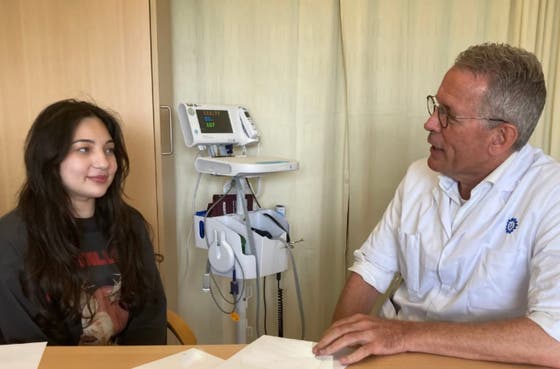Unique trial patients with CF: customisation with organoids

Dilara Vilic is the first European patient with Cystic Fibrosis (CF) to participate in a unique clinical trial at the Wilhelmina Children's Hospital in Utrecht. For the clinical trial, patients are selected for the first time with the Utrecht CF organoid model.
Pediatric pulmonologist Kors van der Ent: "Dilara receives a drug candidate that was first tested in the laboratory on intestinal organoids, mini intestines grown from her own intestinal cells. Based on the result in the organoids, we selected Dilara for the CHOICES trial."
Utrecht leads innovative research
The 030-Lab of the Wilhelmina Children's Hospital and UMC Utrecht coordinates this innovative clinical trial involving 16 centres in 10 different European countries. Thanks to the international collaboration led by Kors van der Ent and Jeffrey Beekman, professor of Cellular Disease Modelling at UMC Utrecht, 52 people with cystic fibrosis have been selected within Europe. Kors: ‘It is an example of using biological characteristics to find a tailored therapeutic strategy for the right person. This gives a greater chance of effective treatment with fewer side effects.’
Jeffrey Beekman developed the first clinical application of organoids for people with cystic fibrosis together with Kors van der Ent. By growing and treating organoids from these people, it is now possible to quickly see whether a particular drug works for this specific person. This is a major benefit in cystic fibrosis, a genetic disease that has many variations and grades and is therefore difficult to treat.
Medicine for rare disease
Based on their organoid response, CF patients are allowed to participate in the CHOICES study and receive a drug candidate developed by the company FAIR Therapeutics, of which both professors are founders. With the ultimate goal: to also make a drug available for CF patients with very rare (pathogenic) variants that addresses the cause of CF.
Kors van der Ent: ‘It is great that the EU is helping to stimulate this, so that we can possibly offer these patients with a rare condition better treatment and therefore more perspective.’ Jeffrey: ‘This approach can also help drug development because testing on organoids gives earlier insight into the success rate of new drugs. The high failure rate of drug candidates is one of the reasons for the high cost of innovative medication.’
About Cystic Fibrosis
Cystic fibrosis (CF) is a serious, congenital disease in which the mucous membranes secrete tough mucus. This causes blockages in the body: in the airways, intestines, pancreas and liver. Over 1,500 people in the Netherlands have CF and 30 children are born with CF every year. Newborns are tested for CF with the heel prick, which detects the disease earlier and ensures that a large proportion of patients can be treated to reduce the impact of the condition.
Cystic fibrosis is caused by an abnormal gene. A child who inherits the abnormal gene from both parents does not make a certain protein. That protein is needed for the transport of chlorine and water through mucosal cells of organs such as lungs, pancreas, liver and intestines. If this does not happen, the mucus in these organs does not get enough moisture and becomes tough.
CF is one of the most common hereditary disorders in the Netherlands; one in 30 people is a carrier of the abnormal CF gene, but is not ill. If parents are both carriers, they have a 25 per cent chance of having a child with CF.
